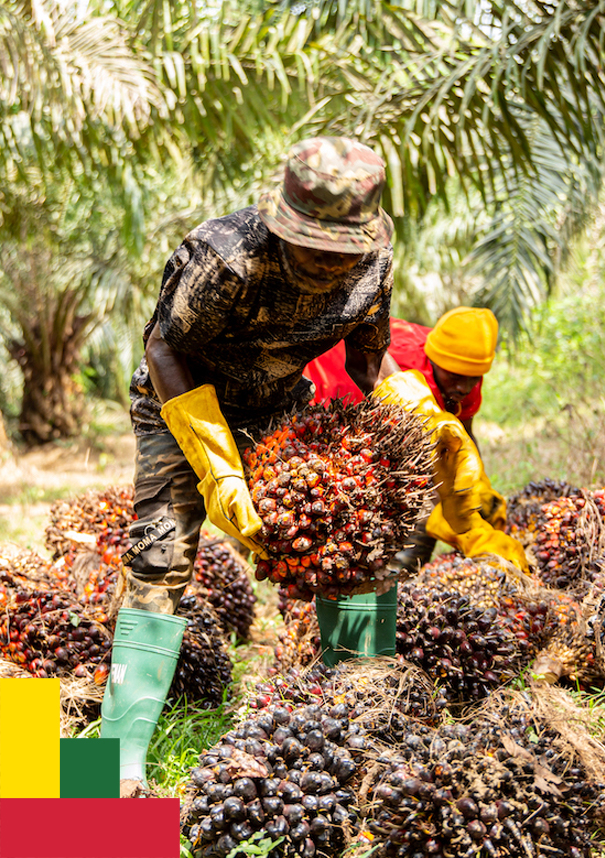The agriculture sector is confronted with low production, low productivity, food losses, limited markets and poor access to credit, among other problems. These have primarily been occasioned by low investment in agricultural modernisation and the entire value chain, leading to food insecurity and the alarmingly high food inflation the nation is grappling with.
The sector is also beset with climate change and environmental degradation aggravated by the increased spate of illegal mining.
The next NDC Government is committed to addressing these challenges through an ‘AGRICULTURE FOR ECONOMIC TRANSFORMATION AGENDA’ (AETA), which will focus on modernising agriculture and promoting agri-business to reduce food inflation, ensure food security, boost exports and create sustainable jobs.
We will:
1. Implement a Feed Ghana Programme to ensure food security by promoting ‘SMART’ agriculture to boost local food production for consumption. Under this programme, we will:
◊ Establish farmer service centres to support farmers with modern agricultural equipment, technologies and inputs in all districts.
◊ Create Farm Banks within agriculture zones to ease land access and irrigation facilities for agricultural purposes and encourage young people to start farming.
2. Implement a Vegetable Development Project (‘YƐREDUA’) to enhance the production of tomatoes, onions, peppers and other vegetables through the following measures:
a. Develop greenhouses and other modern infrastructure for controlled environment farming.
b. Designate ready-to-farm spaces for sustainable openfield cultivation under irrigation.
c. Provide technical support for existing urban and periurban vegetable farmers.
d. Promote home, school and community gardening.

3. Revamp the collapsing poultry industry by incentivising farmers and promoting local consumption under the ‘Madein-Ghana’ agenda.
4. Roll out a ‘Poultry Farm to Table’ Project to boost poultry production in collaboration with Poultry Farmers Associations.
5. Roll out a Livestock Development Project to boost meat and dairy production, especially cattle, piggery and small ruminants.
6. Implement a ‘Feed Industry Programme’ to boost the production of local raw materials to ensure a consistent and sufficient supply of agricultural produce for industrial use
7. Reintroduce free fertiliser distribution, improved seedlings and agro inputs to cocoa farmers to increase yield.
8. Initiate a ‘Youth in Cocoa Farming’ project through a comprehensive support system, including facilitating partnerships with cocoa farm owners to revive and optimise abandoned cocoa farms.
9. Promote Cocoa Farmer Welfare and Support by:
a. Reintroducing the Cocoa Price Stabilization Fund to protect cocoa farmers.

b. Ensuring regular cocoa price increments in line with inflation and market trends.
c. Restoring the payment of bonuses to motivate cocoa farmers.
d. Building new and equipping existing health facilities in cocoa-growing districts to provide healthcare.
e. Assigning a portion of cocoa receipts for health insurance for cocoa farmers.
f. Operationalising the cocoa farmer pension scheme.
10. Facilitate the production of at least 100,000 tons of cotton in the five northern regions.
11. Launch a New Strategic Crops Programme to boost and process strategic commercial crops such as cashew, palm, cotton, and rubber in our agro-industrial zones.
12. Facilitate the establishment of Agro-Production enclaves with appropriate infrastructure, including irrigation and networked warehousing systems.
13. Refocus the Exim Bank to invest in concessional support for farmers through cooperatives and community banks for export promotion.
14. Reintroduce the fertiliser subsidy programme for farmers to boost food production and reduce inflation.
Ghana’s Palm Industry (RED GOLD)
Ghana consumes 250,000 metric tonnes of palm oil annually. Yet, only 50,000 metric tonnes are produced locally by palm plantations such as Benso Oil Palm Plantation (BOPP), Twifo Oil Palm Plantation (TOPP), Ghana Oil Palm Development Company (GOPDC) and out-grower schemes for palm oil refineries in the country.
Ghana imports 200,000 metric tonnes of palm oil annually at $200 million. This means the country only produces 20% of the national palm oil consumption, even though it has the potential to produce about one million metric tonnes of palm oil in the medium term.
Cote d’Ivoire produces 600,000 metric tonnes of palm oil annually, twice its national consumption of 300,000 metric tonnes, and exports 300,000 metric tonnes, while Ghana imports 200,000 metric tonnes, representing 80% of its local consumption.
In 2023, the global palm oil industry was valued at more than $70 billion and is projected to grow at an annual rate of about 5% from 2024 to 2030. This growth is attributable to the growing demand from the food, beverage, biofuel, energy, personal care, and cosmetic industries.
More than half of all packaged products consumed worldwide contain palm oil. It is found in lipsticks, soaps, detergents and ice cream. Despite its vast fertile land, it is depressing that Ghana cannot meet its domestic demand for palm oil, let alone take advantage of the about $80 billion global palm oil industry.
Thus, the next NDC government will aggressively:
1. Develop a national palm oil industry policy to offer incentives for growing palm and develop the entire value chain of the palm oil industry.
2. Acquire land banks to develop commercial palm plantations nationwide and encourage farmers to participate in outgrower palm plantation schemes.
3. Develop palm oil industries through investments, research and development.
















